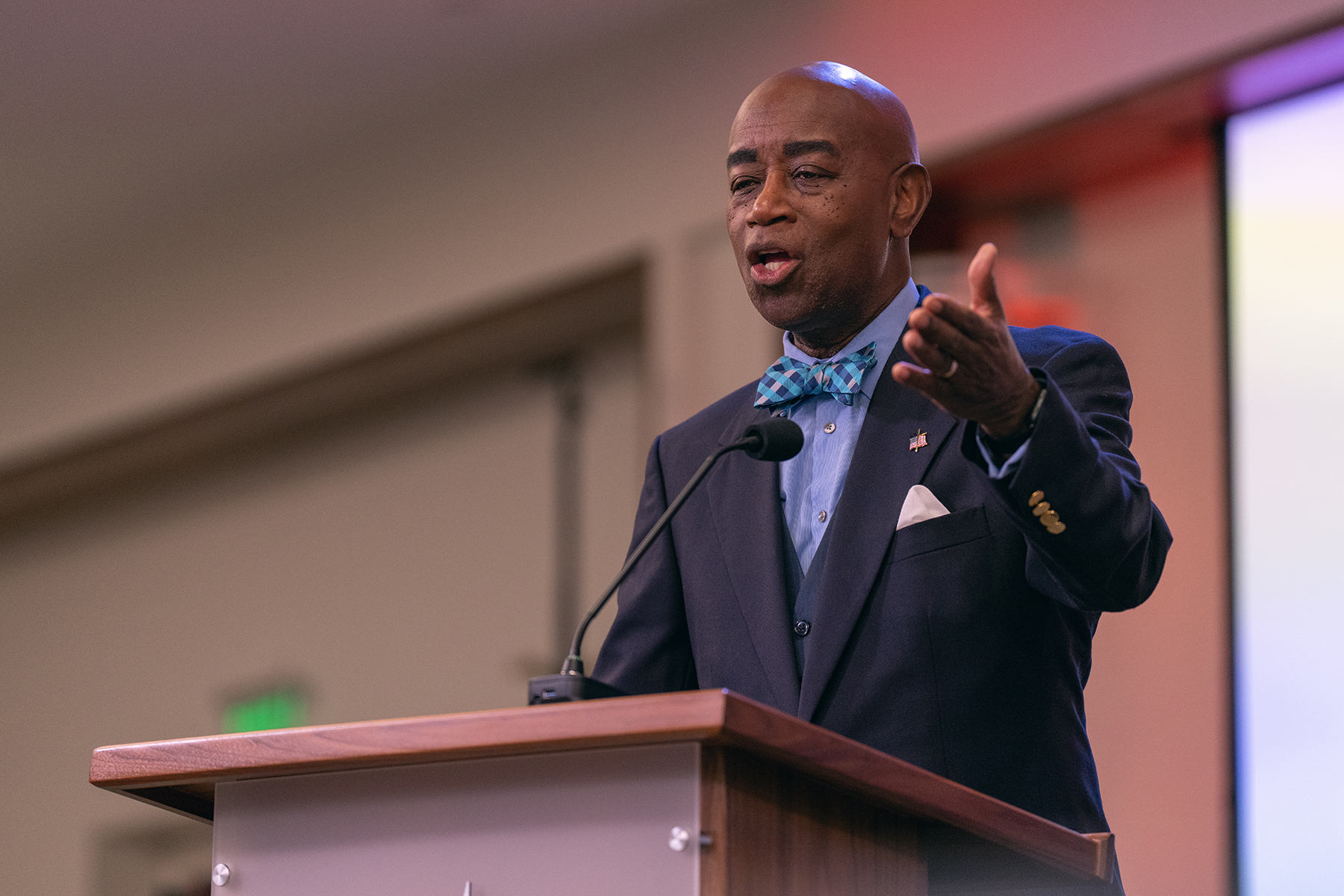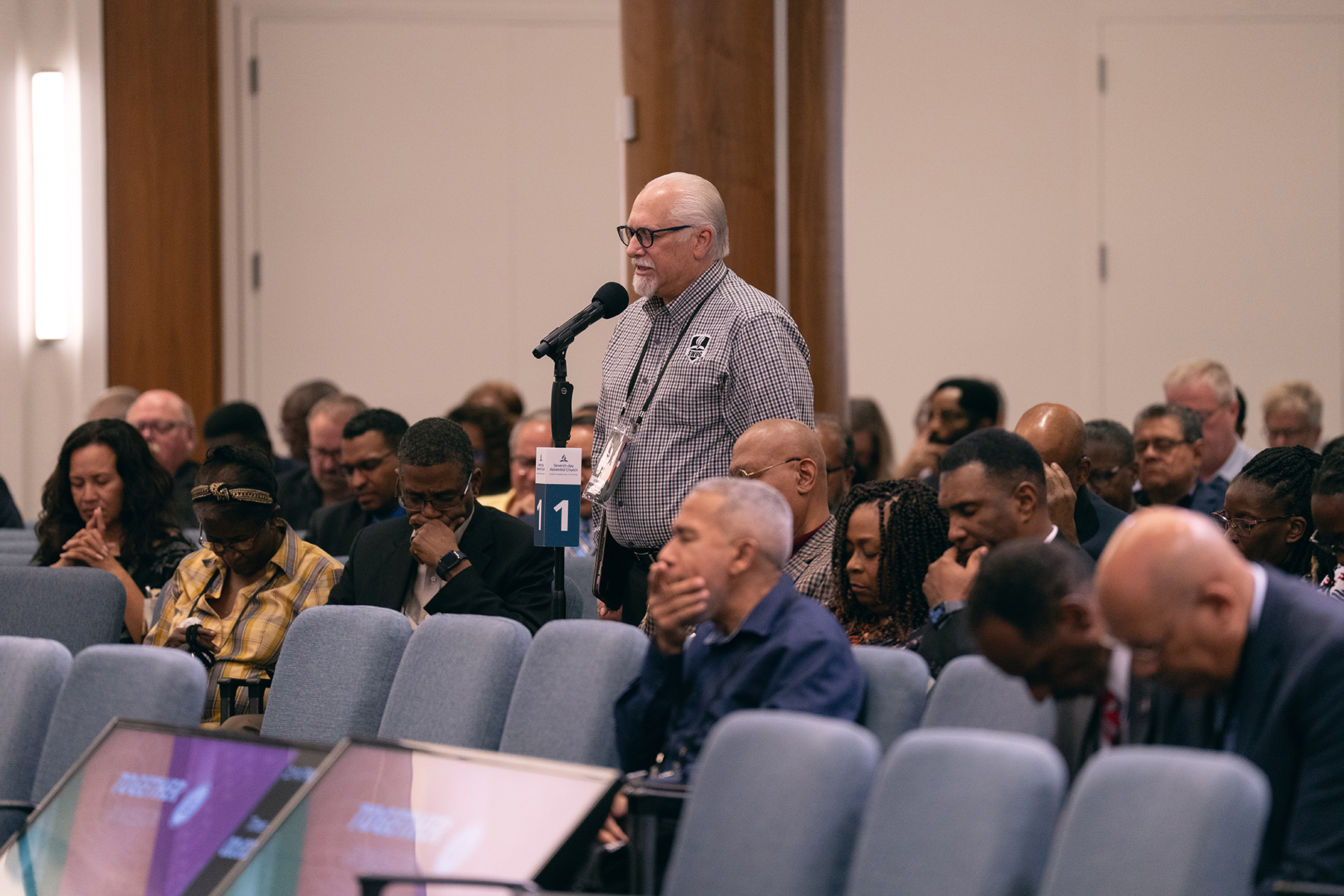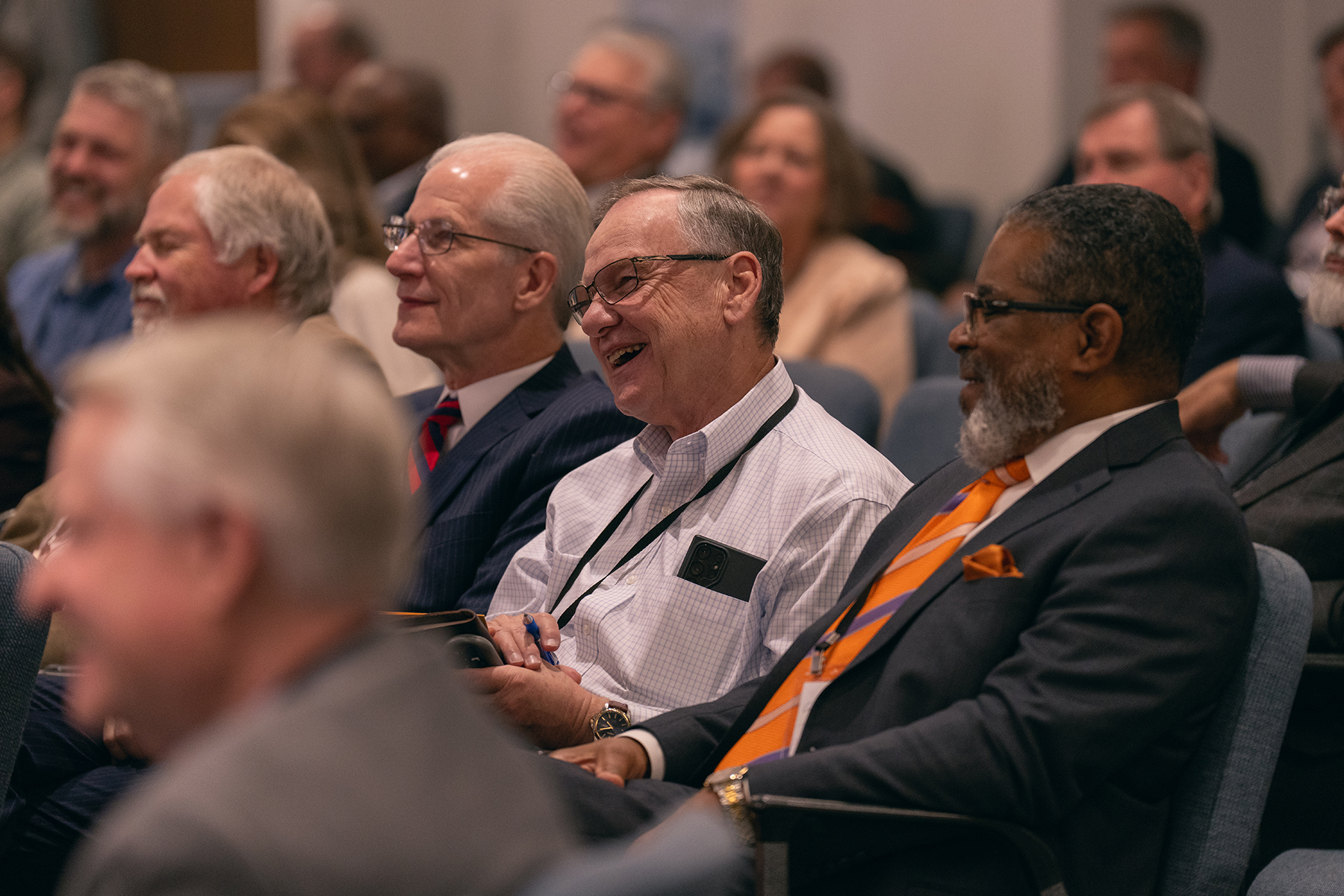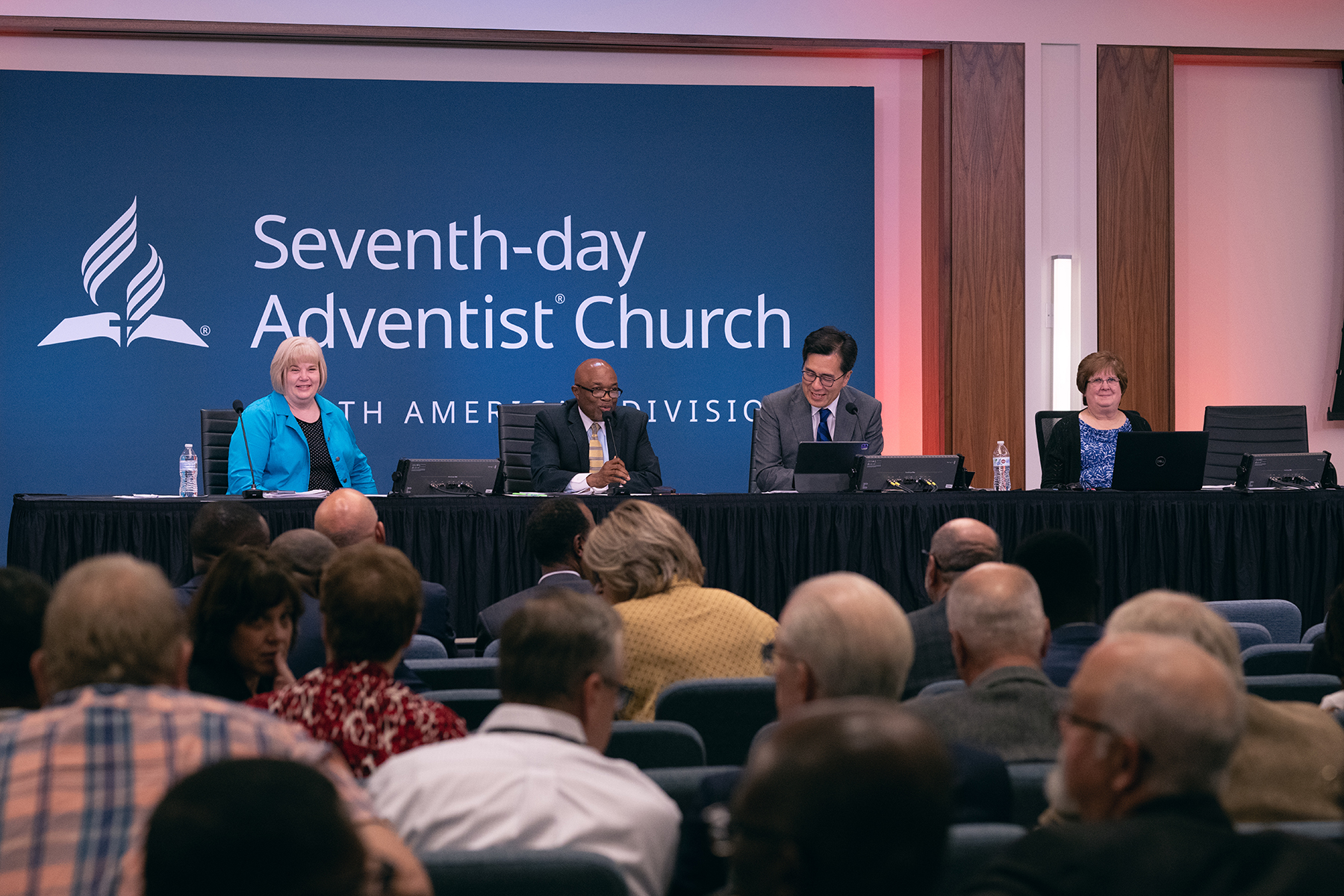
The first business session of the 2023 NAD Year End Meeting culminated with a rousing message from Rear Admiral (Ret.) Barry Black, who assumed office as the 62nd chaplain of the United States Senate on July 7, 2003. He is the first African American and Seventh-day Adventist to hold this position. Photo: Pieter Damsteegt, NAD.
From the outset of the 2023 North American Division Year-End Meeting (NADYEM) on Thursday, October 26, it was clear it would not be business as usual. At times, the meeting was a reunion where friends could laugh while discussing agenda items. Other times, it was a sober call to harness our spiritual resources to minister in today’s volatile context; a message reinforced by special guest Rear Admiral (Ret.) Barry Black, United States Senate chaplain.
As the meeting’s chair, NAD president G. Alexander Bryant, welcomed the approximately 200 NAD executive committee members present (of 306) from Bermuda, Canada, Guam-Micronesia, and the U.S., who would discuss and vote on various business items throughout the week. “It’s good to see your smiling faces and the spirit I already sense in this room,” he said emphatically.
Online hosts Kimberly Luste Maran and Julio C. Muñoz, NAD Office of Communication director and associate director, greeted viewers on the NAD’s Facebook and YouTube platforms and website. They then introduced key elements of the meeting, including policy discussions, worship services, and an in-person screening of The Hopeful, a drama about the church’s beginnings. They also noted upcoming reports from 2022 breakouts on teacher shortages, online churches, and membership data and eAdventist, with a new breakout on pastor shortages.
Tony Anobile, the Southwestern Union’s vice president for church ministries, set a sacred tone, praying, “Father, we love this division, and in [these] interesting times, we need Your guidance more than ever.” Anobile also prayed for the families of the former NAD vice presidents, “faithful soldiers” Maurice Valentine, Alvin Kibble, and Debra Brill, who passed in 2023.

Tony Anobile, the Southwestern Union’s vice president for church ministries, set a sacred tone for day one of the NAD Year-End Meeting, praying, “Father, we love this division, and in [these] interesting times, we need Your guidance more than ever.” Photo: Pieter Damsteegt, NAD.
Bryant emphasized that recent tragedies, both within our NAD family and worldwide, such as wars and shootings, signal Christ’s imminent return and the urgency of our ministry. “It is my prayer that [we’ll] leave this place more inspired, committed, and dedicated to do all we can to finish [God’s] work,” he stated.
Acknowledgment of New Leaders and Committee Members
Shifting to introductions, Bryant first acknowledged fellow officer Judy R. Glass, who was named the NAD’s first woman treasurer this June, to much applause. The positive energy continued as Bryant introduced union presidents, who then introduced new conference presidents and other delegates from their regions.
Bryant paused at the Lake Union Conference to recognize Joi McClellan, one of 10 youth and young adult representatives present. McClellan, a third-year dental student at the University of Michigan and Adventist Christian Fellowship president, was selected by her peers for her experience in both Adventist and public school systems. “You’re in a unique club, … and we’re really happy to have you here,” said Bryant.
Later, Bryant welcomed General Conference (GC) representatives, vice president Tom Lemon, associate secretary Elbert Kuhn, and treasurer Paul Douglas. Delegates also applauded Jorge Aguero, retiring New Jersey Conference president, for 43 years of church service.

Day one of the 2023 NAD Year-End Meeting wasn't just a staid business meeting. Often times, it was a reunion where friends could laugh while discussing agenda items. Photo: Pieter Damsteegt, NAD.
Other critical items were the approval of the agenda and appointment of Todd McFarland, Deputy General Counsel with the General Conference, as parliamentarian. Bryant then appointed McClellan as the NADYEM prayer convenor, “with the sole authority of interrupting discussions and calling for prayer any time the spirit impresses [her].”
Before Black’s address, NAD staff, led by Anika Anderson, introduced the NADYEM theme song – Brooklyn Tabernacle Choir’s “I’ll Say Yes.” Bryant underscored the importance of focusing on the spiritual through prayer and song while doing God’s business.
Biblical Principles for Winning Life’s Race
The meeting culminated with a rousing message from Black, who assumed office as the 62nd chaplain of the United States Senate on July 7, 2003. Bryant introduced Black, the first African American and Adventist to hold the position of U.S. Senate chaplain, as a “modern-day Daniel.” Bryant expressed that the church is proud of him, which delegates later affirmed with a standing ovation.
Black began his message titled “Winning Life’s Race,” with his testimony. “I owe my life to the Seventh-day Adventist Church. Without [the church] … I’d be incarcerated or dead, and I’m not being hyperbolic.” He described his humble beginnings in the Baltimore projects as the fourth child of a mother with a fourth-grade education and a nomadic father. One day, his mother received a handbill for a series, reading, “The day money will be thrown in the streets of Baltimore, Maryland, and nobody will stop to pick it up,” and decided to attend. But instead of receiving cash, as she had hoped, she received the love of Jesus; a “life-transforming experience” for her and Black, the child in her womb when she was baptized.

Judy R. Glass, NAD treasurer, G. Alexander Bryant, NAD president, Kyoshin Ahn, NAD executive secretary, and Sharri Davenport, appointee coordinator, Secretariat, on day one. Photo: Pieter Damsteegt, NAD.
From his early childhood, Black’s mother required him to read and memorize Scripture and sacrificed to put him through Adventist schools. Her faith and God’s providence guided his journey of pastoring 11 churches in North and South Carolina, serving as a Navy chaplain for over 27 years, and finally, ministering to lawmakers on both sides as the longest-serving U.S. Senate chaplain. “This church taught me how to run to win,” he said.
Black offered pointers for winning life’s race, drawing from 2 Timothy 2:3-4. First, be prepared to endure hardness as a good soldier. Second, make lemons from your lemonade. Third, finish your race well. He shared the hope of becoming citizens of heaven as motivation for maintaining our faith despite earthly trials. Finally, he advised delegates not to misrepresent their Savior. He particularly emphasized the need to pray for and honor all government officials, regardless of political differences, as they are appointed by God (Romans 13).
Early in his message, Black shared that during the most recent election period, from November to January, senators, chiefs of staff, and others had adopted a Wesley fast — no eating until 3 pm, named after Methodist founder John Wesley — with supernatural results. He concluded by urging delegates to join senators presently fasting and praying “for the polarization in our land, fasting and praying about the dysfunction in government, … about the Ukrainian war and the Israel-Hamas war.” He stressed, “We are living in dangerous times. I beg you, get your people to do spiritual warfare with you. You talk about what you can do for government every day. This is what you can do. You can make a difference. Our nation needs you.” He then asked those willing to make the commitment to stand and was thrilled when most of the room stood.
As the meeting ended, Bryant expressed his gratitude that Black had been available at such a pivotal time. Said Bryant, “When we invited him here, what I was asking and hoping God would lead him to talk to us about is, how do you lead in the fire? And how do you stay true and faithful through the fire? And the Lord has certainly spoke to us, Chaplain, through your ministry.”
